
Commemoration of All the Faithful Departed (All Souls)
In my homily this weekend for the Sunday Mass, I discuss Jesus’ relationship with the Pharisees, a sect of the Jewish people that were committed to a religious revival of the covenant with God made with Moses and based on the many rules given in sacred scripture. Now I mentioned that Jesus was often friendly with many Pharisees, and agreed with them on many things, although the evangelists focus on their clashes with Jesus as being more instructive in their gospels than their agreements. One thing that they agreed on was the existence of an afterlife, the continuation of our existence after this worldly life is over.
Now you might think that all Jewish people at the time of Jesus believed this, but that would not be correct. Many did not, and in particular a group known as the Sadducees did not. The Sadducees were a fairly small group numerically, but were very important because this was the group that included the richest and most powerful people in Judea and their families, including the most important priests in Jerusalem. This is the group that gets into an argument with Jesus in Luke’s Gospel [20:27-38] about a woman whose husbands keep dying, and she ends up getting married seven times. So some Sadducees mock Jesus by asking him who will be her husband in heaven. We will hear this Gospel at Mass in about a year, so I won’t go into it in depth but what is important now is that Jesus tells them quite clearly and unmistakably that they are wrong. Heaven is so unlike earth that their silly comparison about marriage on earth has no comparison with the love that we experience in heaven, a love for God and all other people. And then Jesus tries to prove to the Sadducees that the principle of eternal life is clearly spelled out in the Old Testament by citing a story from Exodus, from Moses at the burning bush on Mount Sinai. Jesus told them that “the God of Abraham, the God of Isaac, and the God of Jacob … is not God of the dead, but of the living, for to him all are alive" [Luke 20:37b-38 NABRE]. Not were alive. Are alive.
Today, we will memorialize our parishioners who have passed away this year by remembering them by name. Also, all of us present will remember many others by naming them in our hearts and recounting our memories of them. And so the words of Jesus should bring comfort to all that are here. Our God is not the God of the dead but of the living. Jesus, the resurrected, has promised resurrection to all that believe in him. Jesus has won for us the forgiveness of sin that will allow those that obey his commands to enter the Kingdom. However, forgiveness is one thing, and atonement is another thing. God, the loving parent, is to us, his children, as those of us here that are parents are to our children. We love them, we forgive them, but we also hold them accountable and want them to learn from the mistakes that they have made. Parents do this so that they become better people, and God, our eternal parent, does this so as to prepare us for eternal life in his presence. So we believe that for many there is still preparation after death, a need to continue to align ourselves with God’s will so that we will be ready to enter God’s presence. So the Church sets aside today in particular as a day where we pray for our loved ones who have passed away, that they complete the journey and enter the kingdom of heaven. It is our faith that they will then be in the presence of God, the God of the living.


